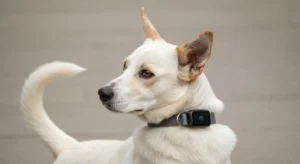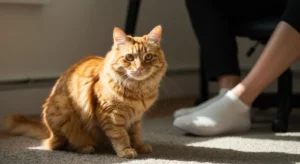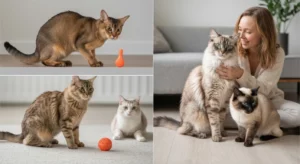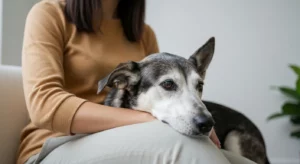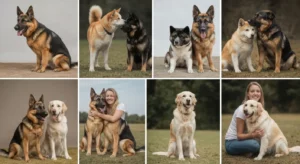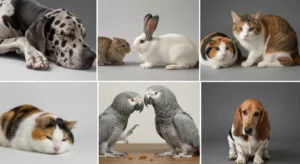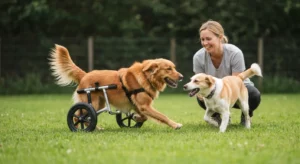The silence in my house used to be a comfortable, predictable thing. It was a silence punctuated by the soft thump-thump-thump of my Golden Retriever Barley’s tail against the hardwood floor, the gentle sigh he’d let out before settling into a nap, and the quiet jingle of his collar as he followed me from room to room. For five years, Barley was my world. He was my co-pilot on long drives, my hiking partner on misty mornings, and the furry, golden anchor that kept me grounded through life’s storms. Our life was a simple, perfect duet.
I never intended to disrupt that harmony. But life, much like the pets we welcome into it, is full of surprises. My surprise came in the form of a phone call about an African Grey parrot named Kiwi.
Kiwi belonged to a distant, elderly relative whose health had taken a sudden turn. The family was scrambling, and no one could take on a highly intelligent, demanding, and very loud bird who was rumored to have a cantankerous personality. I’d always been fascinated by parrots, by their sharp intelligence and complex social needs. A small, reckless part of me, the part that believes any animal can be loved into a state of happiness, whispered, “You can do this.”
My rational mind screamed a thousand objections, the loudest of which was curled up at my feet. Barley. My sweet, gentle, bird-chasing-in-the-park Barley. How could I bring a bird—a potential prey animal—into the home of a predator, no matter how soft-hearted he was? The very idea felt like a betrayal of the safe haven I had built for him. Friends cautioned me. The vet gave me a look that was equal parts pity and warning. “It’s a massive risk,” she said, her words heavy with unspoken scenarios of feathers and tragedy. But the thought of Kiwi being shuffled off to a shelter, confused and grieving the only human he’d ever known, was a weight I couldn’t bear. I said yes.
A House Divided by Fear and Feathers
The day Kiwi arrived, our peaceful home transformed into a high-security zoological facility. I designated the spare bedroom as “The Aviary.” His large, wrought-iron cage was placed in the center, far from the window and any potential drafts. I soundproofed the door as best I could. The rule was simple and absolute: the door to Kiwi’s room remained shut at all times when Barley was out and about.
The first few weeks were a study in managed chaos. My life was partitioned. I’d spend mornings with Barley, taking him for long walks to tire him out. Then, I would sequester him in the living room with a puzzle toy while I ventured into Kiwi’s domain. Inside that room, it was a different world. Kiwi was a ball of feathered fury and grief. He would screech, a sound that could pierce steel, whenever I came near. He’d pace his cage, eyeing me with an unnerving intelligence that felt more like judgment than curiosity. He wasn’t the cheerful, chatty bird I’d read about; he was a wild storm trapped in a box.
Meanwhile, Barley was utterly perplexed. His serene world had been invaded by terrifying noises emanating from behind a closed door. He would lie outside the spare room, his nose pressed to the crack, his brow furrowed. A low, mournful whine would sometimes escape him, a question I couldn’t answer. He wasn’t aggressive; he was just… concerned. The happy rhythm of our home was gone, replaced by a tense, disjointed schedule of separation.
I felt like a failure on two fronts. I was failing to comfort a grieving parrot, and I was making my loyal dog anxious and confused. More than once, I sat on the floor, back against the hallway wall that separated them, and cried. The silence I once cherished was now a tense, waiting thing, and I was stuck in the middle of it.
The Cautious Introduction
After a month, a fragile truce had formed. Kiwi no longer screeched at the sight of me. He would accept a piece of almond from my hand, his black, scaly foot surprisingly gentle as he took it. He even started to mumble a few words, ghosts of his previous life. “Good morning, Arthur,” he’d say softly, and my heart would ache for the man he was missing.
The time had come. I couldn’t keep them separated forever. With a knot of dread in my stomach, I prepared for their first face-to-face meeting. Kiwi was secure in his locked cage. I put Barley on a short, sturdy leash and opened the door to the spare room. I held my breath, my hand trembling slightly on the leash.
Barley stepped into the room, his whole body alert. His nose twitched, taking in the strange, musty-sweet scent of the bird. He saw the cage and froze. His ears perked, his tail gave a single, hesitant wag. He took a cautious step forward. Inside the cage, Kiwi fluffed up his feathers, making himself look twice his size—a classic defensive posture. He let out a low growl, a sound I didn’t know a parrot could make.
I pulled gently on Barley’s leash. “Easy, boy,” I whispered, my voice tight. Barley, ever the good boy, immediately sat. He didn’t bark. He didn’t lunge. He just… watched. His head was cocked, his expression one of pure, unadulterated curiosity. He seemed to understand that this loud, feathered creature was important to me. For ten minutes, they just existed in the same space, a dog on a leash and a parrot in a cage, separated by a few feet of air and a universe of instinct. When we left, I felt a tiny, fragile seed of hope take root.
A Language of Their Own
We continued these supervised visits daily. Slowly, miraculously, the tension began to dissolve. The dog and parrot bond I had dismissed as a fantasy started to feel like a distant possibility. Barley’s posture softened. He’d lie down near the cage, resting his chin on his paws, and sometimes drift off to sleep. His presence seemed to have a calming effect on Kiwi. The growling stopped, replaced by the soft grinding of his beak—a sign of a contented parrot.
The real breakthrough came not from a gesture, but from a sound. Kiwi, the master mimic, began to incorporate Barley into his vocabulary. It started with him perfectly replicating the sound of Barley’s water bowl being filled. Then, one afternoon, as I was praising my dog, Kiwi, from across the room, chirped in a perfect imitation of my voice, “Good boy, Barley!”
Barley’s head shot up. His tail thumped against the floor. He looked from me to the cage and back again, a look of happy confusion on his face. It was astounding. Kiwi wasn’t just mimicking; he was communicating. He had connected the praise with the dog.
From that day on, their interactions became a bizarre and beautiful conversation. Kiwi became Barley’s announcer. “Wanna go outside?” he’d squawk in my exact intonation, and Barley would leap up and run to the door. When he heard my car pull into the driveway, Kiwi would start a chorus of excited barks—not his own, but a perfect imitation of Barley’s—which would send the real Barley into a frenzy of welcome-home wags. The unlikely animal friends were building a bridge of sound, a language only they truly understood.
The trust grew to a point where I felt comfortable letting Kiwi out of his cage while Barley was in the room. I never, ever left them unsupervised, but those shared moments were magical. Kiwi would often perch on the back of the sofa, just above where Barley was sleeping. He’d inch his way down, and with the utmost delicacy, nibble at a stray piece of fur on Barley’s head. Barley, in return, would wake up, stretch, and give the air near Kiwi’s feet a gentle lick. There was no fear, no aggression. Only a quiet, respectful affection that defied all biological logic.
An Unbreakable Family
I thought I had seen the peak of their friendship. I was wrong. The moment that truly cemented the depth of their bond, the moment that still brings tears to my eyes, came on a dark, rainy Tuesday.
I had received some bad news that day, the kind that hollows you out from the inside. I came home feeling fragile and broken. I collapsed onto the couch, not bothering to turn on the lights, and let the tears I’d been holding back all day finally fall. I cried into my hands, my shoulders shaking with quiet sobs.
Within seconds, I felt a familiar, heavy weight as Barley rested his head on my lap. He nudged my hand, his big, brown eyes full of a profound, wordless empathy that only a dog can offer. I wrapped my arm around his neck, burying my face in his soft fur. He was my rock, as always.
And then, I heard the soft rustle of wings. Kiwi, who was usually on his play stand across the room, had flown silently through the dim light. He landed on the back of the couch, right next to my head. He walked slowly, cautiously, down my shoulder until he was next to my tear-streaked face. He didn’t say a word. He didn’t mimic a sound. He just leaned in and gently pressed his head against my wet cheek. He held it there, a small, warm, feathered presence against my skin.
In that moment, in the dim, quiet living room, it wasn’t me, my dog, and my parrot. It was just… us. A family. My gentle giant and my feathered guardian, flanking me on either side, united in their effort to comfort me. They had not only formed a bond with each other; they had woven that bond around me, creating a safety net of pure, unconditional love.
Today, the silence in my house is a new kind of wonderful. It’s filled with the sound of Kiwi whistling a tune while Barley snores softly at his feet. It’s the sound of them sharing a slice of apple—Barley taking his piece gently from my hand, Kiwi taking his from my other. It’s the chaos of a dog and parrot playing their own version of “fetch,” where Kiwi shouts “Get the ball!” and Barley happily obliges. This beautiful, strange, and surprising bond between my dog and parrot has done more than just fill my home with noise and laughter. It has taught me that family isn’t defined by species, and that love isn’t bound by instinct. It just requires an open heart, a lot of patience, and the courage to believe in the impossible.




